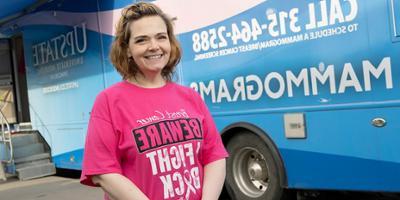Life goes on even as cancer spreads
One surgery treated his 2 separate cancers
BY AMBER SMITH
Vince Lumia’s hobby always involved music, either through his blues band, Modern Mudd, or karaoke singing, or disc jockeying. And he enjoys giving back by working at various benefit events.
He was the volunteer DJ when the Upstate Cancer Center celebrated National Cancer Survivors Day last year at the Rosamond Gifford Zoo at Burnet Park.
Today, at 56, Lumia lives with metastatic colon cancer.
“When people find out you have cancer, the first thing they say is, ‘Oh, I’m so sorry.’ I try to explain to them, it’s not as bad as you think,” Lumia says. Cancer forces you to appreciate every moment, he explains, “and I can’t say I’ve always lived that way.”
He and his wife, Sherri Lumia, live on the North Side of Syracuse and have three adult sons, in Syracuse, Oswego and Raleigh, NC.
They have three grandchildren. They’ve been married 35 years, and Lumia says each year seems like it’s the best.
He was 47 when his doctor sent him for a colonoscopy. He had noticed blood in his stool. “They found a polyp that was too big to snip,” he says. He would need surgery to remove it.
In preparing for that surgery, Lumia went for an imaging scan, which pinpointed the colon cancer but also revealed a tumor on his kidney. Lumia would also need surgery to remove that.
Which was more urgent? The colorectal surgeon and the urologist each believed they needed to operate first; then Lumia would recover for six months before undergoing the second surgery.
What about doing both surgeries at the same time? Lumia asked.
Colorectal surgeon Jiri Bem, MD, and urologist Gennady Bratslavsky, MD, combined their work into a single operation. Both cancers were removed, and Lumia remembers singing two weeks after his surgery.
He regularly went for follow-up blood tests and imaging scans.
“I was fine until the last visit of my fifth year. You know, the one before you’re home free,” Lumia says. “For almost five years, I was cancer-free.”
Cells from his colon cancer were found to have spread to his liver. He underwent chemotherapy and, later, surgery. Today his oncologist, Bernard Poiesz, MD, helps guide further treatment.
This article appears in the summer 2023 issue of Cancer Care magazine.





